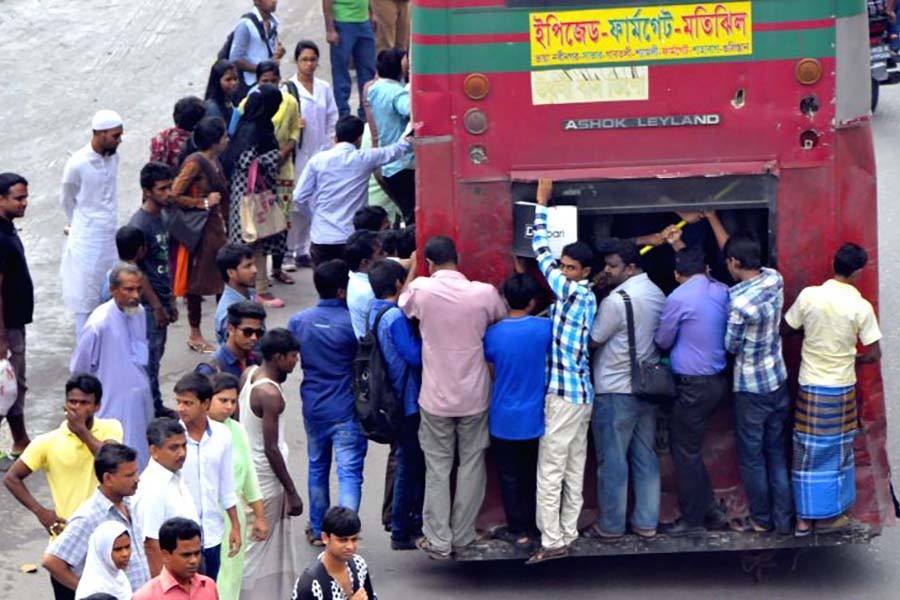Of the total 4.6 million motor vehicles registered in the country, the number of heavy versions is 202,765. A report carried in a Bangla contemporary, quoting a Bangladesh Road Transport Authority (BRTA) source, reveals that about 100,000 drivers are either unskilled or have no licences. In total, about 1.87 million have obtained licences from the BRTA but the rest of the 4.6 million are without the legal documents. Although one of the officials of the BRTA has tried to dispel the concern about men at the steering wheel by claiming that of the drivers unskilled and without licences, the majority are motor cycle drivers, not many will feel convinced. The number of registered motorcycles is about 2.7 million. If the number of driving licence-holders is 1.87 million and 2.4 million have no such valid documents, it cannot be that only the two-wheelers are driven by people without such documents.
If the BRTA has done nothing else, it has at least obliquely admitted its own inefficiency and failure to streamline the transport sector. When the number of drivers without training or licences is more than who have the requisite training and the documents, whose responsibility is it to enforce the legal provision of mandatory obtaining of the approval for driving? Surely it has to be the responsibility of the BRTA. Also, the report claims that 30 per cent drivers in Bangladesh, India and Pakistan have false licences in their possession.
What the report has not mentioned is that of the drivers not holding any licence, a few can have earned on-the-job skill. Learning from veteran drivers, they are capable of controlling the vehicle well but may still lack some technical knowledge such as getting familiar with the various road signs. Since obtaining a driving licence involves a lot of hassles and irregularities bedevil the system, the unlettered and hardly literate avoid applying for the same. Instead, they manage false documents and somehow continue their job by making the on-duty traffic police. The occasional official drives against errant vehicles and drivers make news to the effect that a large amount of fine has been realised from transports and the men at the steering wheel. What does it mean in effect?
If one has no licence, one is disqualified for the job. Either the person must be put behind the bar or forced to obtain a valid document as early as possible before positioning himself/herself behind the steering wheel again. Here though, the realisation of fine is all and the driver faces no bar to take to the steering wheel immediately afterwards. This means the system needs to be reformed so that the disqualified never get chances for driving a motor vehicle, least of all public transports.
In a country where the literacy rate is rising and educated young people are increasingly finding it difficult to get an employment, at least youths with junior school certificate or secondary school certificate should have been in contention for jobs in public transport service. This has not happened. One of the reasons is that the old generation of transport owners do not feel at ease with even the modestly educated youths. It is a rough and ugly world where exchange of abusive languages is the norm. If the drivers are illiterate, so much the better. As for the conductors and helpers of public buses meant for town or city service, they are recruited on their ability to do the simple calculation. No training, no courteous behaviour is required unlike on luxury buses running on long routes.
Thus the city and town services have remained a much neglected area where professionalism has not developed. Hardly a bus runs in this capital without exchange of hot words between passengers and conductors. Sometimes tempers run high and the situation goes out of control. Apparently, lack of education and training and people's intolerance are to blame but looking beyond, it can be observed that the authorities are actually responsible for this. They have allowed chaos to reign supreme in the transport sector. The traffic regulation is conspicuous only by its total absence.
Toll collection of huge amount from vehicles allegedly by various interest groups makes transport operation more costly than it should have been. It suits all the parties, except of course the commuters, to continue with the prevailing mismanagement. All because, they can claim their share of unearned money in the process. The range and scope of taking undue advantage thus only broadens with the addition of vehicles to the operators' fleet.
It is this mindless neglect that has made traffic in Dhaka and elsewhere in the country more chaotic than it should be. Road-unworthy vehicles run by unqualified operators dominate the scene. It is the passengers of public transports who become the only loser. But surely they deserve better service and if the authorities were serious they surely would have got it. If the authorities really mean business, they must first of all formulate a recruitment policy with adequate wages for transport workers. The service must receive a paradigm shift in order to transform it from an undignified venture into a dignified service for transport workers in particular and passengers too. The authorities must work for a lot of streamlining, though.


